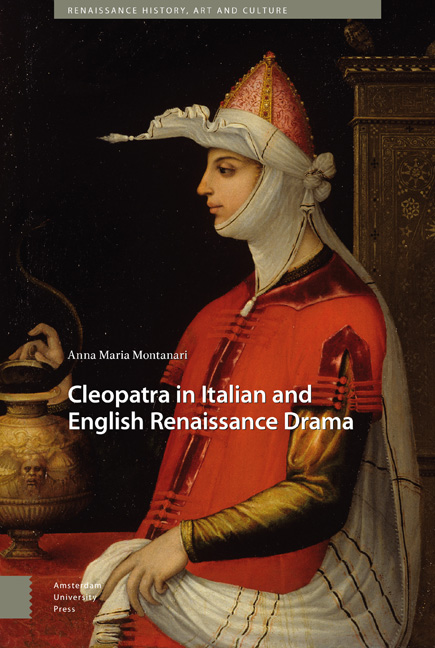Book contents
- Frontmatter
- Dedication
- Epigraph
- Contents
- List of Illustrations
- A Note on the Cover
- List of Abbreviations
- Acknowledgements
- Introduction
- 1 ‘No Humble Woman She’
- 2 ‘The Subject of Talk the World Over’
- 3 The Egyptian Queen's Rebirth
- 4 The Great Theatre of Cleopatra
- 5 ‘The Wanton Luxurie of Court’
- 6 ‘A Lass Unparalleled’
- Conclusion
- Bibliography
- Index
1 - ‘No Humble Woman She’
Published online by Cambridge University Press: 21 November 2020
- Frontmatter
- Dedication
- Epigraph
- Contents
- List of Illustrations
- A Note on the Cover
- List of Abbreviations
- Acknowledgements
- Introduction
- 1 ‘No Humble Woman She’
- 2 ‘The Subject of Talk the World Over’
- 3 The Egyptian Queen's Rebirth
- 4 The Great Theatre of Cleopatra
- 5 ‘The Wanton Luxurie of Court’
- 6 ‘A Lass Unparalleled’
- Conclusion
- Bibliography
- Index
Summary
Abstract
Ancient historiography and Cleopatra. Survey of the surviving works by Greek and Latin authors about her. Latin poets’ hate and admiration for Cleopatra. Virgil’s, Horace’s, and Propertius’ works. Later and minor classical authors’ variations on the subject. Lucan's Pharsalia.
Keywords: Cleopatra; Augustus; ancient historians; Augustan poetry
Cleopatra through the Eyes of Ancient Historians
We do not know much about Cleopatra's life: little more than when she was born (69 BC), the names of her children (one reputedly by Caesar, Ptolemy XV Caesar, nicknamed Caesarion; three by Antony: twins Alexander and Cleopatra, and Ptolemy Philadelphus), the dates of her reign (51-30 BC), her political and private union with Antony, and her death by her own hand (3 August 30 BC). Ancient historians wrote much more about her, but most of what they wrote is not what we would regard as ‘fact’. Classical writers could introduce characters, alter events, and invent speeches with impunity, as it was considered perfectly acceptable in the interest of rhetorical impact. What is more, history is generally written, or rewritten, by the victors, and Antony and Cleopatra lost the war.
The lack of objective testimony becomes apparent if we consider the most important historical accounts from that revolutionary period. Little survives by contemporary authors. A few fragments make up what we have of Octavian’s Autobiography, whose partiality is well known. The only biographical work we still have, the Res Gestae Divi Augusti – a sort of long inscription that was to adorn his monument – is a masterpiece of ambiguity and omissions: Antony is not even mentioned by name. It was on the memoirs of Caesar’s heir that Nicolaus Damascenus (c. 64 BC-c. AD 5) would later draw for his life of Augustus, which is only partially extant. Livy's Ab Urbe Condita lacks his retelling of the Battle of Actium and what we are left with, the so-called Periochae or Summaries – an abridgment of an epitome – are little more than a laconic list of events, albeit enough to tell us that Livy favoured Octavian.
Born a few years after Julius Caesar, Cicero – one of the most famous victims of the proscriptions – did not write any historical narratives. In his Philippics, however, he creates a venomous picture of Antony which is not easily forgotten.
- Type
- Chapter
- Information
- Cleopatra in Italian and English Renaissance Drama , pp. 23 - 40Publisher: Amsterdam University PressPrint publication year: 2019



